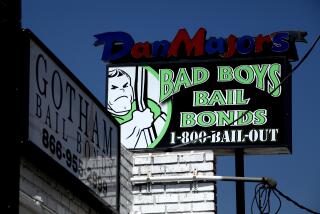Tough on Violence
- Share via
In the past, spousal abuse and other acts of domestic battery were rarely prosecuted because they were considered private matters best kept behind closed doors--if not exactly condoned, then at least widely accepted.
In the future, we hope such attitudes will fade as new generations grow up in a society that sets clear expectations that the home should not be a battle zone, that violence is not an OK way for spouses and other partners to settle their inevitable differences.
In the present, the Ventura County Superior Court is helping to encourage that attitude shift by changing the way it handles domestic violence cases after they enter the criminal justice system.
On Feb. 7, Ventura County officials will launch a specialized court for handling domestic violence cases. People convicted of spousal battery, threats or other crimes of domestic abuse will be required to appear before one judge--rather than several as under the current system.
Judge Charles W. Campbell Jr. will monitor whether defendants are complying with the terms of their probation and will develop working histories of the cases. If a defendant fails to show up for a mandatory counseling session or commits another offense, the judge can impose a jail sentence.
Proponents hope the tough approach will keep convicted batterers on a straight path and reduce the potential for future domestic abuse.
“This is a very, very serious matter,” Campbell told The Times. “It needs some serious intervention.”
Ventura County officials considered starting a domestic violence court several years ago, and decided to follow through after a series of homicides highlighted the problem.
Although overall crime rates in the county are down, arrests for domestic violence have nearly doubled in the last decade, according to state statistics. Between 1988 and 1998, annual arrests countywide rose from 560 to 1,025. They quadrupled in Oxnard, doubled in Simi Valley and jumped by half in Thousand Oaks.
Law enforcement officials attribute much of the increase to greater awareness and willingness among victims to report crimes. Still, they say, many crimes go unreported because victims fear retaliation.
“What we are trying to do is stop the cycle of violence early, hopefully by the first arrest,” said Deputy Dist. Atty. Patrice Koenig, assistant supervisor of the district attorney’s sexual assault and family protection unit.
Judge Campbell has also been talking with public health and social service providers to determine what other services, such as job opportunities, can be extended to families through the new court.
Victim advocates hope the new system will strengthen the message that all domestic abuse will be dealt with seriously in the criminal courts.
And they hope that by singling out those cases, officials will be able to determine which programs are most effective at breaking the cycle of violence that has gripped hundreds of families countywide.
“It is much more common than we would like to see,” Koenig said. “Early intervention in misdemeanor cases is the only strategy that will stop the violence before it causes serious injury and before it can replicate itself in the lives of children who witness the violence.”
Breaking that cycle is the best hope of turning around the ugly upward trend in domestic violence. The court’s new strategy is a worthy step toward winning this war on the home front.
The county will launch a specialized court for handling domestic violence cases, an approach proponents hope will keep convicted batterers on a straight path and reduce the potential for future domestic abuse.
More to Read
Sign up for Essential California
The most important California stories and recommendations in your inbox every morning.
You may occasionally receive promotional content from the Los Angeles Times.










